When Robin Williams committed suicide, I was confronted by the realization that even the happiest looking guy could be disintegrating deep inside.
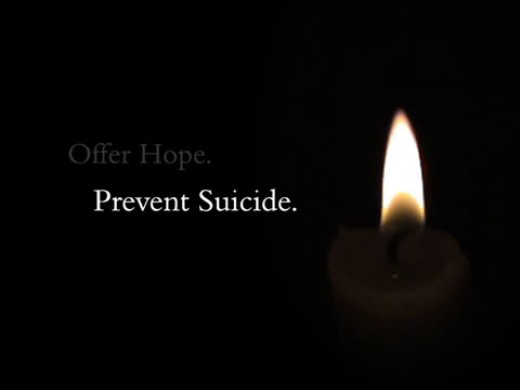
Reading further about his case, I got interested on the subject of mental health and suicide, and the importance of a support group for people silently battling depressions. This led to special focus on the role of social media in suicide prevention, particularly in status updates and suicide risks.
An entry by Elana Premack Sandler in her Can Social Media Help Prevent Suicide?, Psychology Today emphasized the important relationship between suicide and social media.
The most compelling stories I’ve heard are of Abraham Biggs and Paul Zolezzi, two young men who utilized social media during their suicide attempts and completions. Biggs, a college student, broadcast his suicide attempt over the Internet, where countless numbers of people watched him die by poisoning. Zolezzi, an aspiring model and actor, updated his Facebook status message with an apparent suicide note, and then died by suffocation later that day.
It’s fascinating to me that these two individuals chose these ways to reach out, but even more riveting that almost no one responded to their cries for help.
Today, I decided to prove this first-hand by doing a social experiment on my own Facebook wall.
I posted a series of status updates and pictures that gave subtle hints that I am battling depression and contemplating suicide. My goal is to see how my friends will pick the hints, and if someone will actually exert effort to “reach out”. This is not being done to test my friends, but to assess online behaviors and how social media can be an effective means of suicide prevention. (Note: My sincere apologies to friends and relatives for freaking them out and making them worried. But your responses make my heart overflow with joy. Thanks for your concern).
Below is the chronology of events:
My first update was clocked at 1:14 PM (GMT+8) on a Sunday afternoon when most of my friends will be on a weekend off and presumably online.
14 minutes later, I posted another “more obvious” hint. At that point, I have more than 50 friends online.
Another 14 minutes later, I shared an emo picture message.
Later I changed my profile picture.
At that point I started getting private messages from worried friends (and fans?). I have to stop coz I’m freaking them out.
Observations
Here are some note-worthy observations from the experiment:
- Ranting and other negative emotions have become the norms in the social media, making the Internet a big “dump-site” of negativity.
- Daily exposure to ranting and other negative comments in the social media, lowers our sensitivity threshold and eventually desensitizes the human heart’s ability to be empathic.
- As a by-product, most people chose to ignore dramatic tweets and negative/emotional status updates in their Facebook News feed.
- Christians are not immune to depression and suicide. The death of Rick Warren’s son sent a strong message about this fact.
- Researchers found that 54 percent of Americans said churches should do more to prevent suicide,
- This is a wake up call for Christians. How are we responding as beacons of hope?
- FACT: It has generally been found that those who post suicide notes online tend to not receive help.
- We all want someone to listen, and yet most of us are not willing to lend an ear.
- [UPDATED] There is a technical loophole: We CANNOT control how Facebook displays our status updates in the News feed of other people. I got word from some of friends that my status posts were displayed on their News feeds only the following day. So if a suicidal guy posted on FB in hopes that someone would convince him not to do the act, then he’s good as dead. Twitter is more real-time.
Conclusion:
Depression is a stealth and slow killer. Before it kills the body, it first kills the will. It paralyzes the soul.
Depression does not discriminate. men and women of every age, educational level, and social and economic background suffer from depression.
The idea of committing suicide, however, doesn’t happen overnight. In most cases, the person goes through a mental “tug of war”. During this phase, some of the sufferers may “cry for help” through their social media accounts, while others may not be too expressive and simply leave a subtle hint. This is a very crucial point in the life of a person suffering from depression; so crucial that our timely response — or the lack of it — may be the difference between life and death.
However, we are in the the digital age where self-promotion, combined with the usual drama in social media, adversely affects our ability to recognize genuine but subtle “distress calls”.
What do we do next?
Preventing suicide through social media is everyone’s responsibility. Regardless of religious background. We cannot stop the “eternal pessimist” from pouring her heart out and ranting at everything, but we can prevent unnecessary lost of lives by simply “being there”.
When interacting online, it is important to remember:
- Behind every Twitter handle and Facebook profile is a real person.
- Status updates and tweets often have deeper meanings and could be a distress signal. Be on the look out for hints of depression.
- Assume all hints of suicide as real warning signs, especially if there is consistency in the theme of depression and/or suicide. (e.g. a series of posts or jokes with constant theme)
- Most importantly: REACH OUT.
From a Christian standpoint, this is a major wake-up call. We are in the dying world, the flood of “emo posts” in our News Feed shows that more and more people are desperately seeking for help at the wrong places. As Ambassadors of Christ, how are we pointing them to the Prince of Peace? Or are we too “fed up” with all negativity, that we choose to shut out ourselves from the world and enjoy our nice little Christian walks?
Dear children, let us not love with words or speech but with actions and in truth. — 1 John 3:18 New International Version (NIV)
Make a stand against depression and suicide.
If you care enough, share this to raise awareness.
This is not as crazy as pouring ice on your head, but it could also save a life.
PostScript:
Although it is not part of the objective, the affirmation that I have a strong support system and accountability group of supportive friends is awesome. Special thanks to my friends who sent me private messages and other words of encouragement. Sorry for making you worried.
References
http://www.vice.com/read/robin-williams-suicide-meant-something-right-822
http://www.psychologytoday.com/blog/promoting-hope-preventing-suicide
Harnessing New and Social Media to Prevent Suicide, Defense Centers of Excellence, January 22, 2010
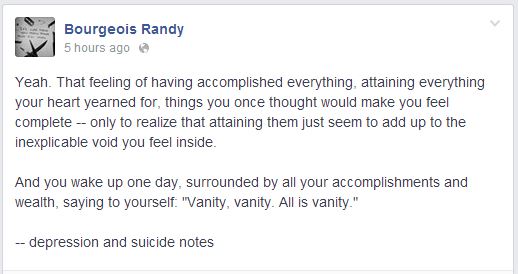
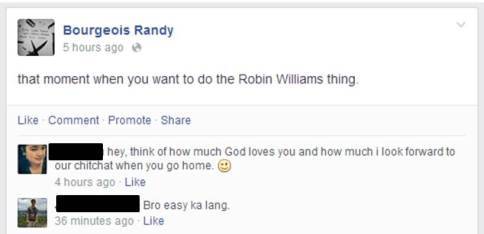
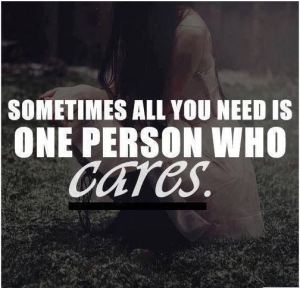
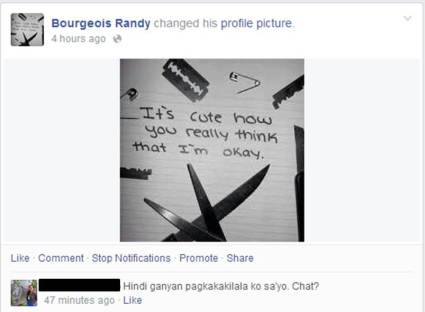

Hi kuya 😀
Now ko lang po ito nabasa. Actually nung nabasa ko yang status mo noon, gusto kong magcomment pero I can’t remember bakit hindi ko tinuloy (ahh siguro kasi naisip ko noon na you are a matured and strong Christian naman, you can handle it..). Well, I think that’s the very thought of some who are “tired” of seeing emo posts in the social media. For a Christian (and a matured one) to post depressive or “emo” status online — it would seem “unacceptable” or a shame for some other Christians also. Naalala ko po noon may nagsabi na wag ipapakita ang kalungkutan para hindi malaman ng kaaway na may problema ka. I think for a really depressive, melancholic person, that’s not an easy thing to do. Kaya mahalaga na alam din ng ibang Christian leaders how to react or respond to someone undergoing depression basing on his/her character and temperament– the likes of introversion and extroversion.
Pasensya po kuya andami kong nasabi; it’s just because I can relate to this because I’m an introvert, and melancholic. I tend to be depressed also. Only few people can understand it– those who are also like me (introvert). And for me, it hurts when co-believers judge depressive Christians without right understanding. Thank you kuya for the post and God bless. 🙂
hi gray, ngayon ko lang rin nabasa itong comment mo. thank you so much for the insights and for affirming my observations. I hope we learn more on how to handle these cases, malay mo it would start in you. Sabi nga, sometimes God will allow us to be wounded and feel pain, so other people will find healing in our wounds.
God speed.
Waaaah kuya nagreply ka po pala, ngayon lang ako nakapag-open ulit. Hihi. Thanks po and God bless din 🙂